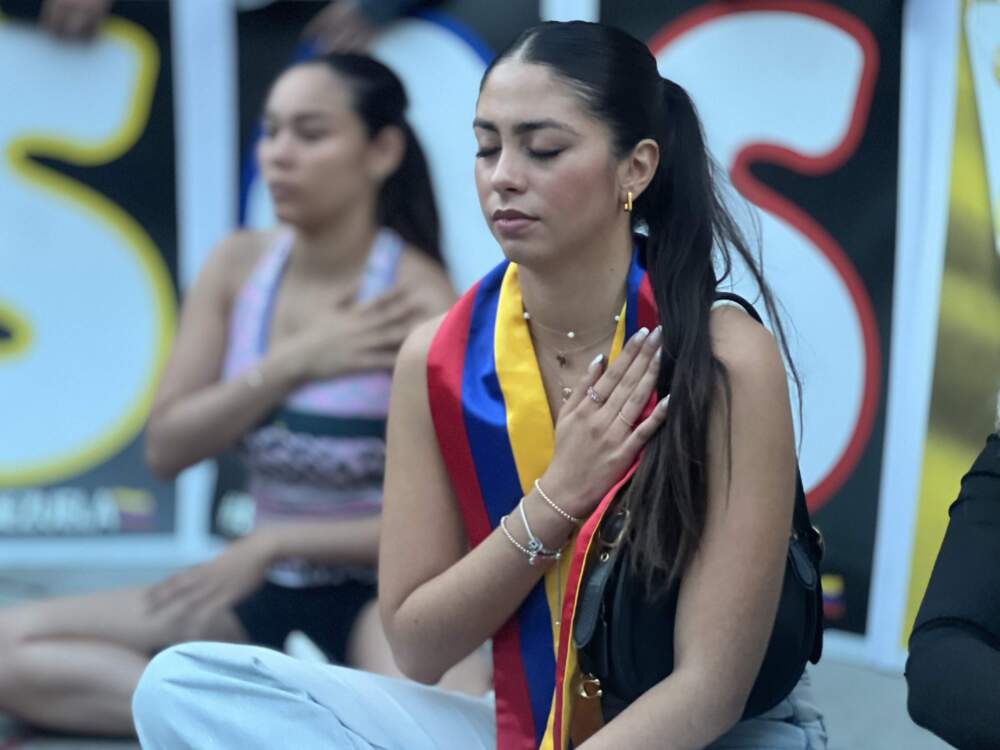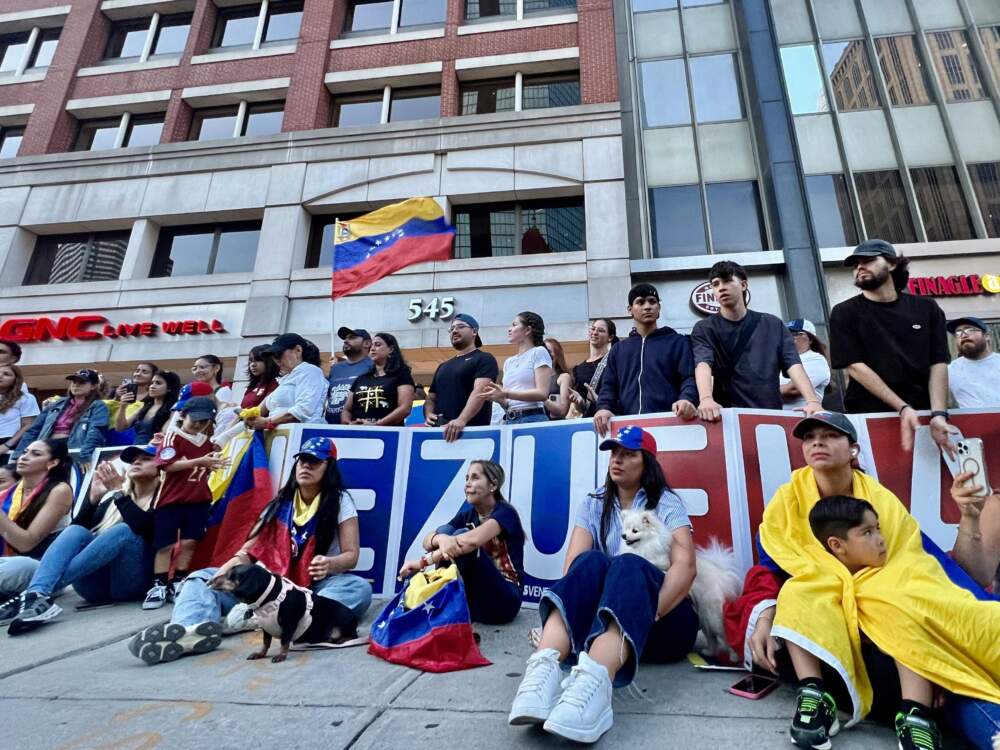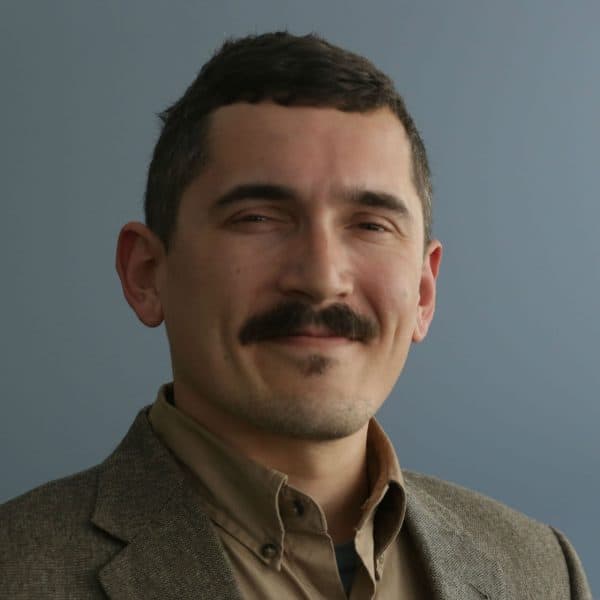Advertisement
Local Venezuelans organize, and pray, to support democracy back home
Resume
On a recent weeknight at Peka Restaurant in Brighton, owner Katiuska Valiente spoke to a group of two dozen compatriots, many dressed in the yellow, blue and red of the Venezuelan flag.
“The idea of today's gathering is to share with the Venezuelan people that we are outside of Venezuela, but we feel affected by everything that is happening at this moment,” she said.
After multiple protests in Boston to draw attention to the presidential election back home that's widely viewed as fraudulent, this time, folks got together simply to pray. They’re calling on a patron saint, La Virgen de Coromoto, to help lift the country from a political crisis that's threatening to unravel Venezuela.
“I'm grateful for the opportunity the United States gave me, but I don't want to die here,” Valiente said in Spanish. “I'm getting goosebumps — I want to return to a free country, a Democratic country.”
Years of political and economic turmoil have spurred about 8 million people to flee the oil-rich nation — some of them to places like Boston. With furor over the recent election, many Boston-area Venezuelans are coming together to call for change.
Venezuela’s election in late July was condemned in the United States, the European Union and several Latin American countries. The opposition party claims to have proof that its candidate Edmundo González won 67% of the vote. But President Nicolás Maduro declared victory, aiming to continue a quarter century of socialist rule that began under his predecessor Hugo Chávez.
Chávez was wildly popular until his death in 2013, but much less so among Venezuelans in Boston. Most of them came here from the upper classes and didn’t buy into the so-called Bolivarian Revolution and “socialism of the 21st century.” This group included former MIT President Leo Rafael Reif and Harvard Kennedy School economist Ricardo Hausmann.
Now, there's a significant shift underway. The ongoing economic crisis has pushed millions from the lower classes of Venezuela to leave the country. Many have braved the dangerous Darien Gap, the jungle between Colombia and Panama, in search of better opportunities abroad, and some are now arriving in Massachusetts.
A defining moment came in September 2022, said local activist Maria Alejandra Bastardo, of the group Casa De Venezuela New England. That’s when Florida’s governor orchestrated a political stunt and sent some 50 Venezuelan migrants on a flight to Martha’s Vineyard. It was perhaps the first time many in Massachusetts became aware of Venezuelans seeking refuge here.
“This is a new generation,” Bastardo said in Spanish. “The majority are in their 20s and they didn’t have the opportunities we had. They arrived crossing the jungles and many countries to get here. And now we find ourselves with a new culture of people that wasn’t here before.”
Advertisement

Hausmann, the Harvard economist, said the election signaled a new era in the fight over Venezuela — some voters appear to have crossed long-established political boundaries to support the opposition. That's the only way the opposition could have secured 67% of votes.
"And that percentage is incredibly similar across all states of the country, all social classes — rural, urban, men, women, young, old," Hausmann said. "So it's kind of a reunification of the country, coalesced around the idea that we need a completely different direction."
Not everyone agrees. Among the old guard of Venezuelans in Massachusetts, a tiny minority supported the Chávez government, and after that the more repressive and less charismatic Maduro.
One in that camp is Jorge Marin, a mechanical engineer in the Boston area who's been in the U.S. since the 1970s and has supported the Bolivarian Revolution over the last two decades.
“Nicolás Maduro is not Hugo Chávez for sure,” Marin said. “He had to learn how to be president and how to administer the government. And I saw right away that he was making a lot of mistakes.”
But Marin blames U.S. sanctions for Venezuela’s economic collapse. And he believes the electoral agency that says Maduro won last month's election — despite the outcry over the agency's failure to publish the official voting tallies as required by law.
“I have to respect that institution,” Marin added. If not, he said, he would lose faith in the entire government.

But most Venezuelans in Boston say the worst possible outcome is to continue with the same regime. Some are raising money to support opposition activists in the country. Others, like attorney Julio Henriquez, are coordinating legal aid for more than 1,100 protestors detained after the election.
On top of his immigration practice, Henriquez is international legal coordinator for Foro Penal, a human rights nonprofit based in Caracas. He said he spends his days on calls "with people in Venezuela that are trying to document specific cases — either arbitrary detentions or disappearances." And, he noted, "for the foreseeable future, that's going to be my main focus."
The stakes are also high for migrants here in Massachusetts. The state has staggered to deal with a wave of migrants seeking shelter, many of them from Haiti. But advocates say arrivals from Venezuela may number in the thousands.
Henriquez said Maduro’s refusal to leave power could trigger a new exodus to Boston and beyond.
“In the event that a transition is not completed, we'll see grave economic consequences for the country, and with increased repression, that's the recipe for mass migration,” he said.
But many Venezuelans are hopeful, after an election they say showed much of the country is united against the current government — as they have been in Boston for decades.
This segment aired on August 8, 2024.
